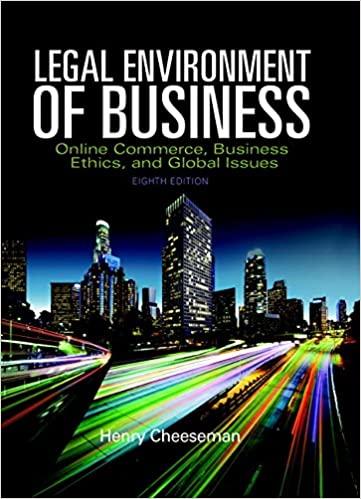Question
Directors and Officers of a corporation 1. can be held criminally liable for offences committed by them for the benefit of the corporation or by
Directors and Officers of a corporation
| 1. | can be held criminally liable for offences committed by them for the benefit of the corporation or by the corporation while under their supervision. | |
| 2. | cannot be held criminally liable for offences committed by them for the benefit of the corporation or by the corporation while under their supervision. | |
| 3. | can be held criminally liable for offences committed by them for the benefit of the corporation but cannot be held criminally liable for offences committed by the corporation while under their supervision. | |
| 4. | Only a corporation itself, because it is a legal person, can be held criminally liable. Not the directors or the officers who are merely employees. | |
| 5. | cannot be held criminally liable for offences committed by them for the benefit of the corporation but can be held criminally liable for offences committed by the corporation while under their supervision. |
A standard form contract, also known as a contract of adhesion,
| 1. | requires the person who receives it to read, approve, and change the terms as required in order to be deeme a valid contract. | |
| 2. | almost without exception, a person is neither asked nor expected to read, approve or change the terms. | |
| 3. | is called a contract of adhesion because the person is essentially stuck with the contract, having no choice in the matter whatsoever. | |
| 4. | is a contract where the person has the choice to "take it or leave it" with respect to each proposed term, thereby customizing it to their needs and preferences. | |
| 5. | is difficult and expensive to draft as it is customized each and every time. |
The unintentional tort of negligent misrepresentation does not require knowledge of the falseness of the information, only carelessness in its creation. To prove negligent misrepresentation, there must be a duty of care based on a "special relationship" between the representor and the representee and
| 1. | all of the above. | |
| 2. | the representation in question must be untrue, inaccurate, or misleading. | |
| 3. | the reliance must have been detrimental to the representee and damages resulted. | |
| 4. | the representee must have reasonably relied on the negligent misrepresentation. | |
| 5. | the representor must have acted negligently in making the misrepresentation. They must have fallen below the standard of care required of a professional making such a representation. |
Step by Step Solution
There are 3 Steps involved in it
Step: 1

Get Instant Access to Expert-Tailored Solutions
See step-by-step solutions with expert insights and AI powered tools for academic success
Step: 2

Step: 3

Ace Your Homework with AI
Get the answers you need in no time with our AI-driven, step-by-step assistance
Get Started


